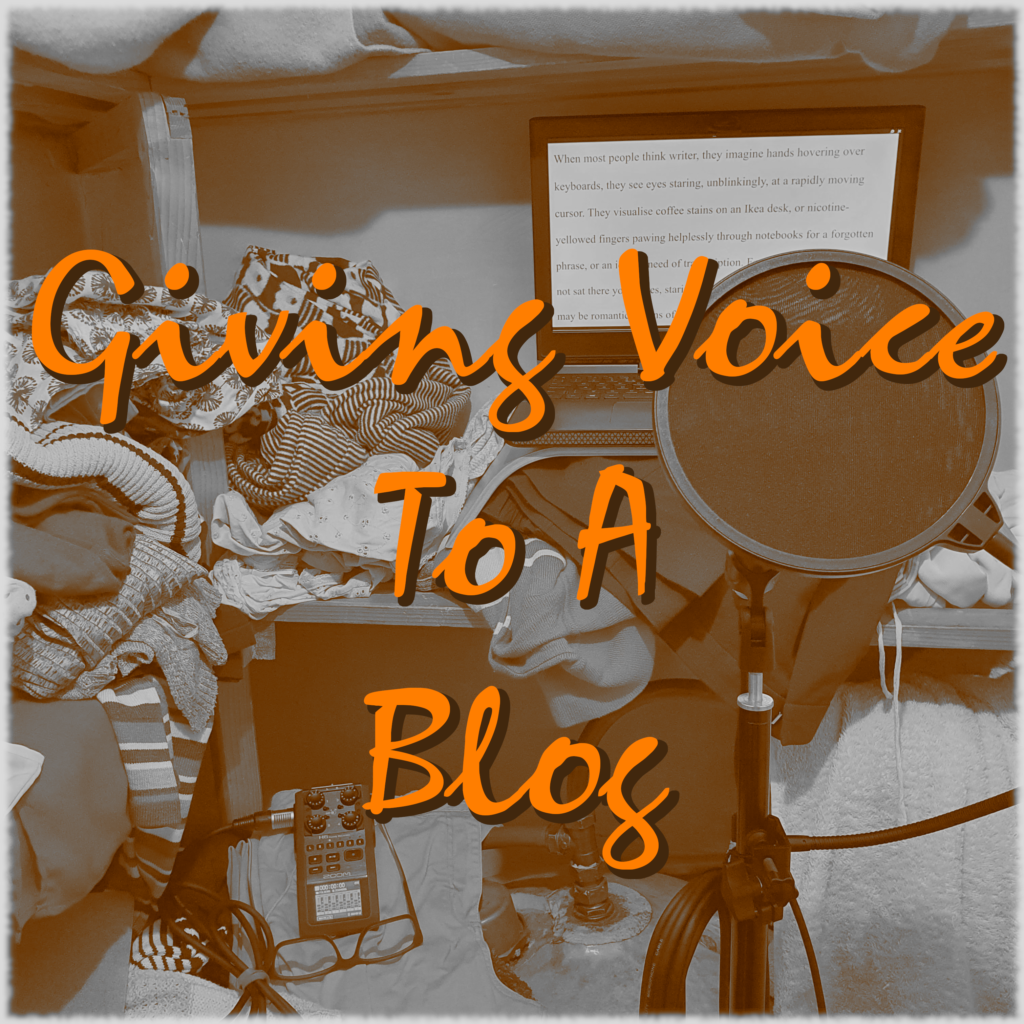
When most people think writer, they imagine hands hovering over keyboards, they see eyes staring, unblinkingly, at a rapidly moving cursor. They visualise coffee stains on an Ikea desk, or nicotine-yellowed fingers pawing helplessly through notebooks for a forgotten phrase, or an idea in need of transcription. For those of you who have not sat there yourselves, staring at a blinking, stationary cursor, there may be romantic visions of high-backed chairs, behind opulent, antique desks which sit in expensively decorated offices. Others of you may conjure up a writer’s den which is a low-ceilinged, uncarpeted bedsit, with a miserable desk off to one side, and an unkempt bed pressed hard against an unpainted wall.
Few of you would imagine the writer as a bald, sixty-something crowded into an airing cupboard, reading his blog from a laptop which is balanced precariously on a mountain of freshly laundered underwear.
A microphone stands before him, mute and accusatory. It seems alive and takes the place of all the sarcastic teachers who ever berated him as a child for stammering over uninspired textbooks.
You may remember that feeling, the panic which spread through you as you counted-off heads and sentences in an effort to find the one you would have to read out loud to the inmates who make up the rest of your class. While you found your reading, other junior scholars opened mouths and stumbled through passages and your index finger turned white, bloodless as it ran back and forth under the sentence you were destined to share. At moments like this you muttered the words to yourself, silently incanting them, prayer-like, in your head, in the vain hope of memorising them. Finally, you were as ready as you anybody pumping toxic levels of adrenaline was ever going to be.
Everybody else’s readings had passed you by, the meaning of the text was lost to you, but you were prepared, or were you? Your name was called, your palms became hot puddles of sweat, and suddenly your tongue was tripping over words which were a deformed version of the incanted ones, a spell gone wrong. Your index finger flew backwards more often than forwards on the page, progress through your sentence was painfully slow, but you got to the end of it with minimal sarcastic shrapnel hitting you head-on. The full stop was reached, and you hung onto it like a drowning man might cling onto a life jacket after jumping from the Titanic, with little hope of long-term survival. Although there may have been icebergs to the left of you, icebergs to the right, you were alive, safe for now. That’s when your teacher invariably asked you to read the next sentence.
By the time I reached my teens, my phobia of reading out loud had reached its zenith. By now, I was fumbling my way through Latin, French and Irish texts, and no matter who the teacher was, or what the subject, everybody in the class was expected to contribute. The written word, itself, held no demons for me any longer. I spent many nights tucked up in bed with a good book, a reading lamp illuminating words which kept me awake into the early hours of the morning. However, once pressed to share the joy I normally took from this solitary practice, the old tongue-tied-ness regrouped. During English class, my contribution to the public reading of our prescribed novel was a stammering, incoherent, deconstruction of a brilliant text into its disjointed parts. Somehow a working engine seemed to be transformed into scrap metal as I read. These readings can best be thought of as my contribution to dystopian storytelling at its best. The emotional scars ran deep. By the time I left school I was sworn off ever reading in public again, yet here I am, a mountain of clean linen behind me, a microphone before me and a script challenging me to a duel.
I first hit the un-mute button for my video work. A silent how-to on making apple jelly, or recovering a lampshade, sort of defeats the purpose of empowering others to follow suite. So, I wrote a script and set to work. The results have been hearteningly well received. Apple jelly fans are a passionate lot, lampshade lovers, less so, but very much more appreciative, in a quiet sort of way.
This podcast came about because people I knew preferred to listen to, rather than to read blogs.
While writing was an obsessive-compulsive disorder in my case, reading them was something I was reluctant to do. There was little point. My bleatings would get lost in the wilderness that is cyber space as it competed with millions of other writers who vied for your attention. But others were adamant, which is why I am standing in a linen closet, talking to myself right now.
The reason I am here is that getting the sound from the writer’s lips to the listener’s ears is fraught with difficulties.
Some people believe that so long as they possess an I-Phone they hold the key to worldwide, podcast domination. They believe that the phone is a multi-media, Swiss army knife of sorts, capable of keeping you current on your twitter feeds, posting pictures on Instagram, or filming, and editing, award winning documentaries. Can there be any doubt that recording a podcast must be simplicity itself?
The answer is yes. Sound is a devious creature. Without proper acoustic dampening, a bedroom recording sounds like one made in the deepest, darkest cave ever discovered. It becomes an echo chamber where whatever you say reverberates for eternity, even if you use a proper microphone; one shielded from direct contact with the p sound, which left unguarded, hits the eardrum like an out of tune base drum.
Whenever I sit at my desk and type, the outside world makes itself heard. Birds spread the message that they ready to settle down with any mate eager enough to respond to their lusty warblings. The wind today is from the east, and every April shower that comes along announces itself by hammering against my window, making this room unsuitable for recording anything, other than a shopping list.
Anybody who has read my blog about my writer’s desk will remember that I am a guest in my mother’s home. She has the ultimate say on any changes which get done to her house. And she is a no-changes-to-my-house kind of a person. This is ok with me, but it means that improvisation is required, if I am to record anything which meets even the most basic audio standards.
This is why I record my podcasts in the hot press. It is the only room in the house without a window, which means that the winds can blow as hard as they like without rattling glass panes, and birds can have the most raucous of orgiastic feasts, and my mic shall remain deaf to their antics. The clothes, too, are useful, as the washed linens, piled high on shelves all around me, dampen reverb, and make this room the only echo free chamber the house has on offer.
It is a strange feeling, though, standing before a microphone, script before me, underwear piled up high all around me, to read my work into a microphone in the hope of capturing something of the spark which tickled my imagination and brought me, willingly, to my writer’s desk with an urge to share these thoughts.
What drives me to splutter into the microphone, I cannot say. It is not an easy process. There is the problem of breath control. Really, an actor is more suited to this job than an author. A writer may hear voices as he writes, but that does not mean he can read them back to you as they were imagined. There are the coughing fits too, hay fever in no friend to a man locked in a hot press with a manuscript and a microphone. And what will people make of my voice? Is my accent off-putting? Perhaps it speaks of white privilege. Is it too male? To deep? Too squeaky? Body image may cause all sorts of neurosis, but when you are stuck with a voice recorder, watching audio levels rise and fall with your voice, in a stuffy little room, you can get well past neurosis and enter the gates of total funk.
And if you supress that panic all the way to the end of the blog, the process is only half-way through. Now comes the edit. Your first opportunity to listen to messages from a linen closet. Only, now you get to see your voice as well as hear it. Waveforms appear before you and accuse you of whispering here, or shouting there. If you are like me, you cannot tell a lut from a decibel, so the screen you face is more like an art instillation than anything else. It seems deliberately obscure. But with the help of YouTube videos, you eventually have a file ready for podcast. Whether anybody will listen to your finished recording, is not really a question that bothers you. You have had your say. You have read every word of your blog without interruption, sarcasm, or laughter stopping you. You have given voice to the words on the page, sometimes, that is the only thing that matters.

One reply on “Giving Voice To A Blog”
I hear you ;))…
Glad you survived those dreadful school days “reading” aloud.